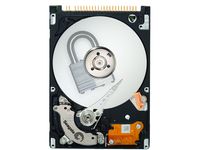Seagate Intros Self-encrypting HDDs
A notebook computer is stolen every 52 seconds, according to statistics compiled by the FBI; 97 percent of them are never recovered. How much sensitive personal information is stored on your machine? Is it encrypted? Probably not.
Seagate has a solution: its third-generation Momentus FDE (full disk encryption) internal drives and Maxtor BlackArmor portables use 128-bit AES encryption to automatically secure the contents of the entire drive. Until now, Seagate had offered self-encryption only with its lower-capacity, lower rotational-speed drives (a 160GB drive that spins its platters at 5,400 RPM goes for around $150 at retail). The company is now shipping 320GB, 7,200 RPM drives to its OEM customers, and expects to have 500GB models in early 2009.
“Our solution is very difficult to crack,” said Joni Clark, product marketing manager for Seagate’s personal compute business unit, “because there’s an ASIC on the controller board and the key is in the media itself.” BIOS-managed Momentus FDE drives (the type a consumer would use) are FIPS 197 validated (meaning they’re approved by the U.S. Government’s National Institute of Standards and Technology’s Computer Security Division for unclassified applications).
Enterprise-managed Momentus FDE drives (the type government agencies and Fortune 1000 businesses would deploy) features FIPS 197 validation too, but they’ve also been tested and accepted for use in U.S. national security systems by the super-secretive National Security Agency.
“Having your laptop with you wherever you go is as common as having your wallet with you,” said Clark. “But nobody wants to start over with an all-new laptop. Using our drives, you can retrofit the computer you already own.”
Get Tom's Hardware's best news and in-depth reviews, straight to your inbox.
-
joex444 Odd, Fujitsu just announced a 500GB model with 256bit encryption today. It didn't explicity say it was using AES, but I would assume that it would be.Reply -
Shadow703793 sorry about the last post. Mods delete it. Should help governments and corporations with foiling data theft.Reply -
Darkk I don't know why Seagate even bothers with it. They need to stick to what they do best is make damn good hard drives and leave the encryption stuff to the other folks like PGP and TrueCrypt.Reply
Dell have tried this approach before with their certain line of laptops with hardware encryption but it never caught on simply because people don't know how to use it or even know it's there.
